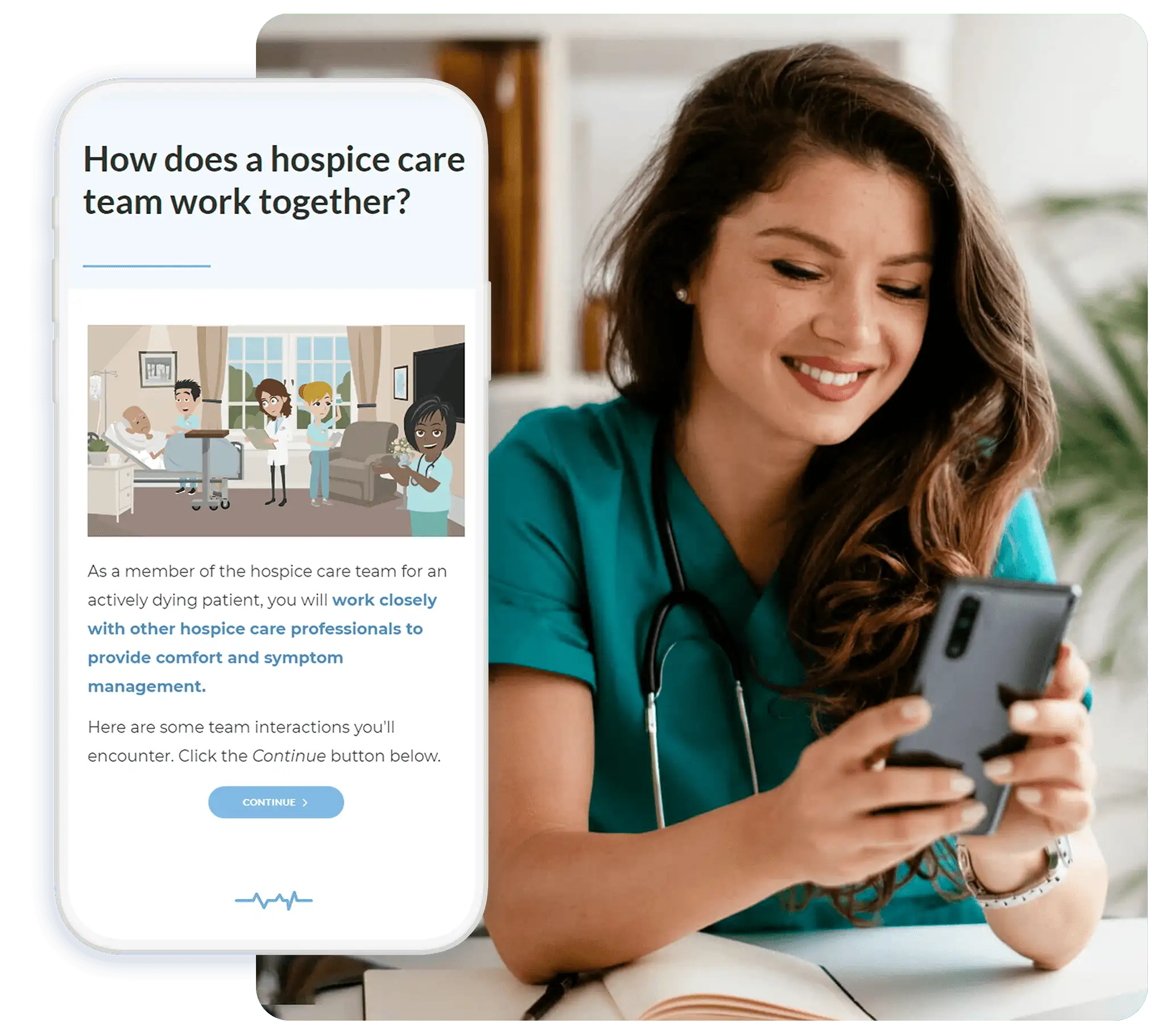FICA Spiritual Assessment Tool: Patient Path to Enlightenment
Hey there, fellow hospice professionals. Are you seeking a practical, efficient, compassionate approach to understanding your patients’ spiritual needs? The FICA Spiritual Assessment Tool is what you need. If you want a quick download, click below. But read on for a detailed overview.
The FICA tool is a fantastic instrument designed to help hospice teams assess and address the spiritual aspects of our patient’s lives. It’s like the GPS guiding you through the often uncharted territory of spiritual care. Let’s dive in!

What is the FICA Spiritual Assessment Tool?
FICA stands for Faith and Belief, Importance and Influence, Community, and Address in Care. It’s a simple, easy-to-remember acronym that represents a comprehensive approach to spiritual assessment, designed by Dr. Christina Puchalski and her team at the George Washington Institute for Spirituality and Health.
The FICA Spiritual Assessment Tool is like a trusty map for navigating the vast landscape of spirituality, helping us understand how our patients’ faith, beliefs, and values shape their lives and influence their decisions. It’s about more than just religion – discovering what gives life meaning, purpose, and hope and part of the hospice philosophy.

CONTINUA LEARNING
Simplify Your Hospice Team’s Training and Skill Building
A complete online solution for your agency: more than 125 hospice courses, caregiver in-services, training plans, and more.
How to Use the Fica Tool for Spiritual Assessment
Using the FICA Spiritual History Tool is as easy as…FICA! Here’s a breakdown of the key components to get you started:
Faith and Belief
Begin by exploring your patient’s faith, beliefs, or values, and taking a spiritual history. You can start with an open-ended question like, “What beliefs or values are important to you?” or “What gives your life meaning?” Remember, this isn’t just about religious affiliation; it’s about understanding the core principles that guide their lives.
Importance and Influence
Next, delve into the importance and influence of these beliefs and values in your patient’s life. Ask questions like, “How do these beliefs or values impact your daily life?” or “How have they shaped your decisions regarding your healthcare?” This will help you gauge how much their spirituality affects their overall well-being.

Community
Community is the glue that holds our spiritual lives together. So, ask your patients if they’re part of a faith or spiritual community and how this community supports them. You can ask, “Are you part of a spiritual or faith community?” or “How does your community support you in times of need?”
Address in Care
Lastly, address your patient’s spiritual needs in their care plan. This may involve incorporating their beliefs and values into the care they receive, connecting them to resources or support from their spiritual community, or offering chaplaincy services. Ask them, “How can we support your spiritual needs during our care?”
And there you have it! With the FICA Spiritual Assessment Tool, you’re well on your way to providing compassionate, holistic care to your patients.

FICA Spiritual Assessment Tool PDF
Looking for a handy reference for the FICA Spiritual Assessment Tool? Download a PDF version here that you can print, share, or keep on your devices. Trust me, it’s like having a pocket guide to spiritual care right at your fingertips!
FICA Spiritual Assessment Tool Case Studies
Let’s take a look at a couple of case studies to see how the FICA Spiritual Assessment Tool can be applied in real-life situations:
Case Study 1: Susan, a 55-year-old patient with advanced cancer, was hesitant to discuss her prognosis and clinical treatment options. Using the FICA Spiritual Assessment Tool, her hospice care team discovered that Susan’s faith played a significant role in her life, and she believed in divine healing. By incorporating her beliefs into her care plan and connecting her with a spiritual counselor, Susan felt more comfortable discussing her healthcare decisions and addressing her fears.
Case Study 2: Mark, a 75-year-old patient with dementia, was struggling with feelings of isolation and depression. Through the FICA Spiritual Assessment Tool, his hospice care team learned that Mark had been an active member of his local church but had lost touch with his faith community due to his illness. By connecting him with his church community and offering spiritual support, Mark’s emotional well-being improved significantly.
Wrapping it Up
So, there you have it! With the FICA Spiritual Assessment Tool, we can better understand our patients’ spiritual needs and provide more comprehensive, compassionate hospice and palliative care. It’s a win-win for everyone involved!

FAQs
To ensure we cover all the bases, let’s address some of the most frequently asked questions about the FICA Spiritual Assessment Tool.
Is the FICA Spiritual Assessment Tool only for religious patients?
Absolutely not! The FICA Spiritual Assessment Tool is designed to address spiritual issues of all patients, regardless of their religious affiliation, beliefs, or background. It’s about understanding what gives their lives meaning and purpose, which may or may not be rooted in a specific faith tradition.
Can the FICA Spiritual Assessment Tool be used with patients of any age?
Yes, indeed! The FICA Spiritual Assessment Tool can be adapted to suit patients of any age, from children to older adults, and of any faith or belief. The key is to modify your approach and language to suit the patient’s age, developmental stage, and cognitive abilities.
How long does it take to complete a FICA Spiritual Assessment?
The time it takes to complete a FICA Spiritual Assessment can vary depending on the patient and their unique needs. However, the beauty of the FICA Tool is its flexibility, allowing you to engage in a brief or in-depth conversation, depending on the situation. Generally, it can take anywhere from 10-30 minutes to complete the assessment.
How do I document the findings from a FICA Spiritual Assessment?
Documentation is crucial in ensuring continuity of care and providing a comprehensive overview of the patient’s needs. Include the key findings from the FICA Spiritual Assessment in the patient’s medical record, noting their spiritual beliefs, values, community involvement, and any specific spiritual care interventions or resources discussed.
What are the 5 types of instruments used for spiritual assessment?
Various instruments and tools are available for spiritual assessment, each with its unique approach and focus. Here are five common types of devices used for spiritual assessment:
- FICA Spiritual Assessment Tool: As discussed earlier, the FICA tool assesses Faith and Belief, Importance and Influence, Community, and Address in Care.
- HOPE Spiritual Assessment: HOPE stands for sources of Hope, Organized religion, Personal spirituality and practices, and Effects on medical care and end-of-life decisions. This tool is another popular choice for healthcare professionals, as it provides a comprehensive overview of patients’ spiritual beliefs, practices and how they impact healthcare decisions.
- SPIRITual History Tool: SPIRIT is an acronym for Spiritual belief system, Personal spirituality, Integration with a spiritual community, Ritualized practices and restrictions, Implications for medical care, and Terminal events planning.
- JAREL Spiritual Well-Being Scale: The JAREL Spiritual Well-Being Scale measures patients’ spiritual well-being using three domains: Faith/Belief, Life/Self-Responsibility, and Life Satisfaction.
- Duke University Religion Index (DUREL): The DUREL is a brief, self-report questionnaire that measures patients’ religious involvement, including organizational religious activity, non-organizational religious activity, and intrinsic religiosity.
Fica spiritual assessment tool scoring?
The FICA Spiritual Assessment Tool does not have a scoring system. Its primary purpose is to guide healthcare professionals in understanding and addressing the spiritual needs of their patients. It serves as a conversation framework to explore patients’ spiritual beliefs, values, and needs and to incorporate them into their care plan.
